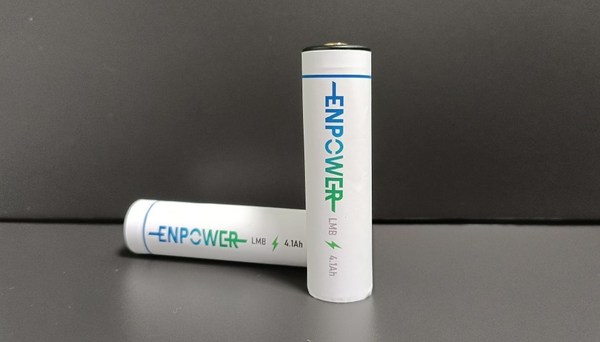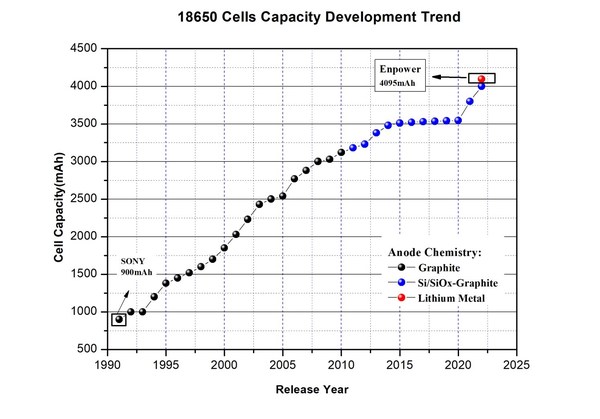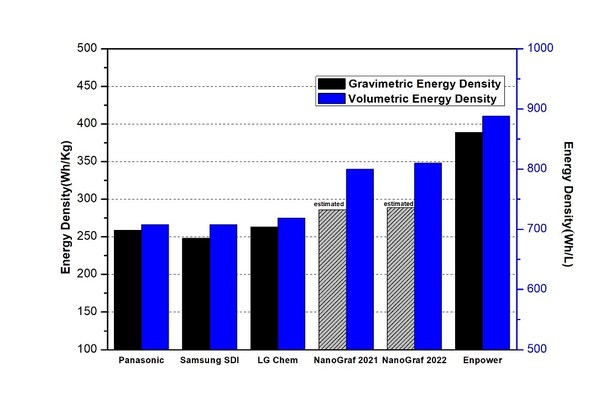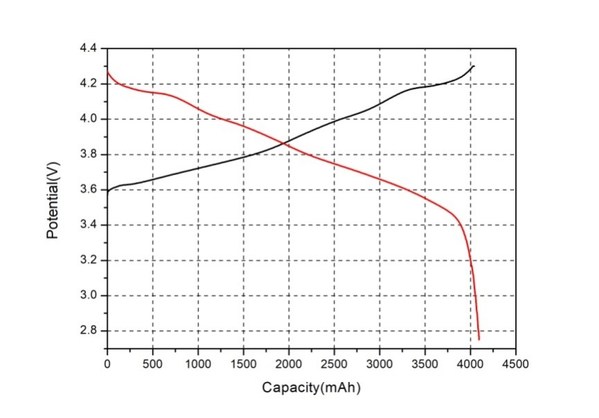SAN JOSE, Calif., Nov. 3, 2022 /PRNewswire/ -- Enpower Greentech Inc. (a global solid-state battery developer based in the US, having operations in Japan, and China) has successfully developed a 4095mAh cylindrical battery, delivering industry leading energy densities of 389Wh/kg and 888Wh/L. This development has resulted in a new energy density record in the class of rechargeable 18650 cylindrical batteries. Enpower's version, which is at least 20% lighter and is packed with at least 15% higher energy than those currently on the market, will clear the way for lighter, more energy-efficient electronic devices including, among others, drones, electric crafts, and electric cars.
The 18650 cylindrical battery (referring to a battery size with a 18mm diameter and 65mm height) is an industry standard for lithium-ion battery cells. It was invented and industrialized by SONY in 1991, where it was used widely in portable electronics. In 2008, Tesla's first all-electric sports car (the "Roadster") was launched using 18650 cylindrical batteries produced by Panasonic. This represented the first deployment of the 18650 cylindrical batteries in the EV industry. In September 2020, Tesla announced the 4680 large cylindrical battery during its "Battery Day" event, kickstarting a new wave of development on cylindrical battery technology in the EV industry.
While SONY's 18650 lithium-ion battery was a revolutionary product, its capacity was limited to 900mAh (as shown in Figure 1A). During the past 30 years, capacity has increased gradually, year by year, with Panasonic launching the 3450 mAh 18650 battery in 2015. Since then, the capacity of the 18650 battery has stagnated, while Korean and Chinese players caught up, launching 18650 cylindrical batteries of 3500mAh. In 2021, the American start-up NanoGraf announced its own 18650 battery with capacity as high as 3800mAh (3.8Ah) using a silicon-based anode. This October, NanoGraf further announced an increased capacity of 4000mAh (4.0Ah). On the other hand, most development in next-generation batteries (including lithium metal and solid-state batteries) has focused on the format of pouch cells. In recent years, by contrast, very little has been done on cylindrical batteries.
Over the past three years Enpower Greentech has successfully developed lithium metal pouch cells with record-breaking energy densities. Its record-breaking 18650 cylindrical battery leverages its proprietary technologies on lithium metal anode into the cylindrical batteries. This increases the (nominal) voltage of 18650 battery by 100-200mV, raising the battery's capacity to 4095mAh (as shown in Figure 2), and reducing its weight by almost 20%, compared with the high-capacity 18650 products using silicon-based anodes. As a results, the gravimetric energy density of Enpower's 18650 cell is significantly improved (Figure1B). Moreover, as shown in Table 1 (EGI LMB18650-4.1Ah), new milestones have also been reached in cell capacity, (nominal) voltage, and volumetric energy density for 18650 batteries.
Table 1 18650 Batteries' PerformancesCapacity | Nominal Voltage | Weight | Gravimetric Energy Density (Wh/kg) | Volumetric Energy Density1) (Wh/L) | |
Panasonic 2) | 3450 | 3.6 | 48 | 259 | 708 |
Samsung SDI 2) | 3450 | 3.6 | 50 | 248 | 708 |
LG Chem 2) | 3500 | 3.6 | 48 | 263 | 719 |
NanoGraf 3) | 3800 | N/A | N/A | N/A | 800 |
NanoGraf 3) | 4000 | N/A | N/A | N/A | 810 |
Enpower Greentech | 4095 | 3.8 | 40 | 389 | 888 |
Among the next-generation batteries using either silicon-rich anodes or lithium metal anode, most have an issue of cell swelling during charge and discharge. To ensure top performances, they require an external pressure to be applied. Enpower's 18650 cell demonstrates the advantage of cylindrical cell structure, in which the battery can deliver stable cycling performance without applying external pressure.
The 18650 cylindrical lithium metal battery (LMB) developed by Enpower Greentech is currently being pilot tested. The company is seeking collaborators in diversified battery applications, including EV OEMs, to achieve commercialization through partnerships. The company plans to leverage this breakthrough technology to develop ultra-high energy density in the 2170 and 4680 cylindrical batteries. The company expects to achieve a battery capacity of 32Ah and an energy density of 400Wh/kg in its 4680 cylindrical cell. (Tesla's current 4680 battery capacity is around 27.5Ah, and the energy density is around 300Wh/kg) 4).
Reference:
1) The volume of 18650 cells used for Wh/L calculation is 0.01753 L (D:18.5 x H:65.25 mm).
2) https://www.nasa.gov/sites/default/files/atoms/files/nabw21_li-ion_cylindrical_hard_case_cells_market_2021_ver1.pdf
3) https://electrek.co/2022/10/20/nanograf-battery/
4) https://insideevs.com/news/598656/tesla-4680-battery-cell-specs/amp/
Contact Information:
Enpower Greentech Inc.
Email:contact@enpower-greentech.com
 2 years ago
402
2 years ago
402 









 English (United States)
English (United States)